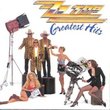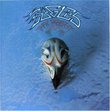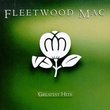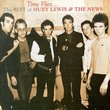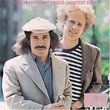| All Artists: Moody Blues Title: Best of Members Wishing: 0 Total Copies: 0 Label: Polydor / Umgd Release Date: 1/28/1997 Album Type: Original recording reissued, Original recording remastered Genres: Pop, Rock, Classic Rock Styles: Soft Rock, Progressive, Progressive Rock, Psychedelic Rock, British Invasion, Album-Oriented Rock (AOR) Number of Discs: 1 SwapaCD Credits: 1 UPC: 731453580022 |
Search - Moody Blues :: Best of
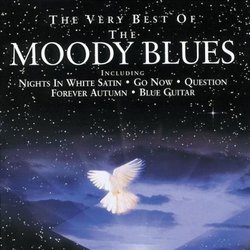 | Moody Blues Best of Genres: Pop, Rock, Classic Rock
Fans of the Moody Blues hungry for the band's intoxicatingly rich arrangements and soaring melodies need look no further than this terrific compilation. What it lacks in depth this collection makes up for in breadth, spann... more » |
Larger Image |
CD DetailsSynopsis
Amazon.com essential recording Fans of the Moody Blues hungry for the band's intoxicatingly rich arrangements and soaring melodies need look no further than this terrific compilation. What it lacks in depth this collection makes up for in breadth, spanning the band's 30-year history of hits from "Tuesday Afternoon (Forever Afternoon)" to "Your Wildest Dreams." Featuring some of Justin Hayward and John Lodge's best songwriting and packed with performances truly worthy of the superlative adjective greatest, this collection of hits delivers the goods. --L.A. Smith Similarly Requested CDs
|
CD ReviewsA well-done compilation, but perhaps misleading... Dave | United States | 12/11/1999 (4 out of 5 stars) "Obviously this "The Best of the Moody Blues" CD is aimed at casual/ new fans of these symphonic rockers, and on that level, it does work very well. To 'paint outside the lines', the disc contains the memorable Hayward-Lodge tune "Blue Guitar", as well as the wonderful single mix of "Forever Autumn" which is also not officially a Moodies' track, but is a must-have, and I think the only other place it's available on CD is on the "Time Traveller" box set. This disc also contains the pre-1967 hit "Go Now" from when future Wings member Denny Laine was handling lead vocals, and there's no denying that it sounds joltingly out-of-place in this context. One thing that I feel is worth pointing out is that, apart from "Forever Autumn" and "Go Now", all the songs on this CD were written by Justin Hayward and/ or John Lodge, and that's perhaps misleading for people just getting to know the group--it might make them think that the Moodies' were essentially the Hayward & Lodge band, and although that's pretty much what it HAS evolved into over the years, that's certainly not the case with their "Core 7" albums from 1967-1972. Ray Thomas, who was a longtime member of the Moody Blues, wrote many songs for the group, including the famous Timothy Leary tribute "Legend Of A Mind" which, somewhat bafflingly, isn't included here. I don't think it would have been a bad idea to lose, say, "Voices In The Sky" and "Go Now" to make room for "Legend..."--I mean, "Go Now" really is drastically out-of-place here, and not all that great to begin with, and it would be nice to have at least one quality composition from another member other than Hayward & Lodge. But like I said at the start, this CD, which contains over 77 minutes of music, does work very well for casual and new fans of the Moodies, so I definitely give the disc a thumbs up. (Strangely, the version of "The Best of the Moody Blues" that I have has different cover art than what is shown here at Amazon. The liner notes feature an interview with Justin Hayward which is a nice bonus, and the track listing is identical, although there is perhaps a difference in the remastering.) (P.S. As an additional note, I'd like to comment on the version of "Nights In White Satin" that this disc features--it seems that some listeners are up in arms over this. The version here is by no means a patchwork edit. Yes, it is missing some string overdubs in the last verse, but listen with headphones & you'll notice the difference between this & the version on each of the two main versions of the "Days of Future Passed" CD (not how it sounded on the original vinyl)--this is a more spacious, less diluted sounding version. For the true original full-length version of "Nights", including the "Late Lament" poem portion, as it appeared on the original "Days of Future Passed" vinyl, the only place I know for sure you can find it is on the "Time Traveller" box set.)" Buyer beware. Dave | 07/27/1999 (3 out of 5 stars) "How do you fit so many Moody Blues songs on one CD? That's easy...you edit the hell out of them. Nights in White Satin is edited in the very beginning and also has a large portion of the ending cut out. There are others edited as well, including Tuesday Afternoon. If you don't mind that, this CD offers a good sampling of their great music. I bought it for the song Forever Autumn from War of the Worlds. It's the single version that was often played on radio. I like the song so much that I wanted both versions. In fact, this may be the only CD, other than War of the Worlds, that has this beautiful song." I Love the Moodies; this CD is but a Taste Lonnie E. Holder | Columbus, Indiana, United States | 02/04/2006 (4 out of 5 stars) "Having a "best of" the Moody Blues is sort of like a best of Bach. What it is really meant by "best of" is that this music was generally the most radio played. Working within that limitation, this music is a little taste of what this group has contributed to rock music, though I could have wished that other tracks or additional tracks were chosen. If you would like more than what this CD has to offer, I recommend purchasing the "Time Traveler" collection, which has either four CDs or five CDs, because there are two different versions of this collection. If you really enjoy the Moody Blues, I strongly urge you to buy their first seven albums, which begin with "Days of Future Passed" and end with "Seventh Sojourn."
This collection has "Go Now" from "The Magnificent Moodies," an album that was very different from what was to come. This version of the Moody Blues included Ray Thomas, Mike Pinder, Denny Laine, Graeme Edge, and Clint Warwick. After several singles Laine and Warwick left, to be replaced by John Lodge and Justin Hayward; the Moody Blues were born! From "Days of Future Passed (1967 in U.S.)" is "Nights and White Satin" and "Tuesday Afternoon (Forever Afternoon)." This concept album mated rock and classical music together, and heralded art rock and symphonic rock. Occasionally bombastic and pretentious, this album is one of the best selling rock albums. "In Search of the Lost Chord (1968)," the most psychedelic album by the Moody Blues, contributes "Ride My See Saw" and "Voices in the Sky," two very different songs that give you few clues as to the album. At the time the "House of Four Doors" and "Legend of a Mind" combination on that album was unique in rock. The Moodies changed styles for "On the Threshold of a Dream," and apparently none of the wonderful music from this 1969 album was considered "best." Similarly, none of the excellent music from "To Our Children's Children's Children (1969)" is included. Featuring a more rock-oriented sound, "A Question of Balance (1970)" provides the radio favorite "Question," again avoiding some of the other, equally good tracks of the album. Perhaps the most progressive album the Moodies ever did, "Every Good Boy Deserves Favour (1971)," provides "The Story in Your Eyes." The Moody Blues ended their string of albums in 1972 with the solid rock album "Seventh Sojourn," which provides "Isn't Life Strange" and "I'm Just a Singer (In a Rock and Roll Band)." The members of the group went their separate ways for a while in 1974, during which time Justin Hayward released the mellow song "Blue Guitar." The even better Justin Hayward solo effort "Forever Autumn" from Jeff Wayne's "War of the Worlds" is also a part of this collection. These two songs are the only solo efforts in this collection. In 1978 the five members of the group came together one last time to record "Octave," which retains elements of the previous seven albums. This album provides the song "Steppin' in a Slide Zone." After this album, keyboard player and ethereal song writer Mike Pinder left the group permanently. After replacing Pinder with Patrick Moraz, the group recorded "Long Distance Voyager" in 1981. This number one album yielded two radio hits, "The Voice" and "Gemini Dream." The Moody Blues' music was increasingly mellow and commercial. In 1983 "The Present" was released, which contributes "Blue World" to this collection. In 1986 the Moodies tried too hard to make current music, and released "The Other Side of Life." The song "Your Wildest Dreams," probably the best song from that album, is included here. The title track was also released as a single. While the album is perhaps one of the best produced, the Patrick Moraz's keyboards frequently overwhelmed the music on the album. Note that Patrick Moraz left the Moody Blues in 1991, not to be permanently replaced by another keyboardist. In 1988, "Sur La Mer" was released, which included the song "I Know You're Out There Somewhere." This song is generally considered a sequel to "Your Wildest Dreams," and was probably the best song from this album. Since 1988 the Moody Blues have released three more original albums to date (2006), yielding several interesting songs. To find those songs you either need a different collection, or you need to purchase those albums, which are "Keys of the Kingdom (1991)," "Strange Times (1999)," and "December (2003)." Another milestone during this time was the departure of Ray Thomas from the group after the recording of "Strange Times." The Moody Blues began as an album group, and I think it is easier and better to listen to their early music in its entirety. Later albums were less cohesive and typically were not concept albums, so the songs represented from those albums are mostly adequate. The problem is that each of us likes different aspects of the Moody Blues, so one album is unlikely to capture everything we like about the group. If you want to see what the Moody Blues have contributed to music, you will only get a taste here. Once you have heard this music, consider whether you want to go deeper. Just be careful, the later albums are not nearly as good as the earlier albums. Good luck! " |

 Track Listings (17) - Disc #1
Track Listings (17) - Disc #1
